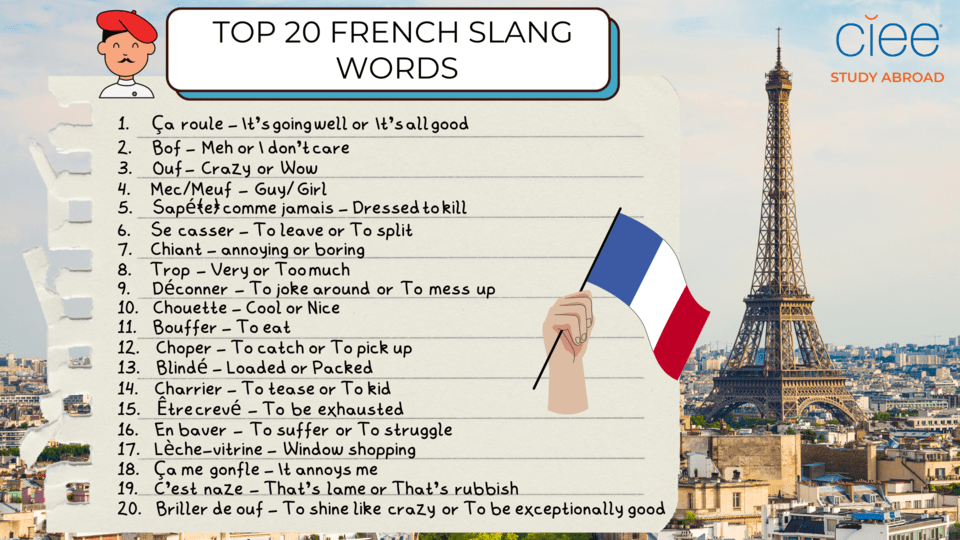France, a country renowned for its rich culture, beautiful language, and vibrant history, is also home to a dynamic and ever-evolving lexicon of slang. From the bustling streets of Paris to the sun-soaked beaches of Nice, the French have developed a variety of informal expressions that give their language a unique and colorful flair.
Whether you’re a language enthusiast looking to advance your French slang or new to the language and preparing to immerse yourself in French culture for the first time, understanding some slang can provide invaluable insights into the daily life and attitudes of the French people on a study abroad adventure in France.
Let’s dive into the top 20 French slang phrases and words you need to know ahead of your journey.

Read More: Top 4 Places to Study French Abroad
Top 20 French Slang Words and French Slang Phrases
French Slang #1: Ça roule
Meaning: “It’s going well” or “It’s all good.”
This phrase is often used to ask or respond to questions about how things are going. It’s a relaxed and friendly way to check in with someone.
For example: “Ça roule?” (Okay?) / “Oui, ça roule.” (Yes, it works.)
French Slang #2: Bof
Meaning: “Meh” or “I don’t care.”
“Bof” is a versatile expression of indifference, used when you’re not particularly excited or upset about something.
For example: “Tu veux aller au cinéma ce soir?” (Do you want to go to the movies tonight?) “Bof, si tu veux.” (Ugh, if you want.)
French Slang #3: Ouf
Meaning: “Crazy” or “Wow.”
“Ouf” means crazy in a good way. It’s used to express surprise or admiration.
For example: “Ce concert était ouf!” (That concert was insane!)

French Slang #4: Mec/Meuf
Meaning: “Guy”https://www.ciee.org/”Girl.”
These casual terms are the French equivalents of “dude” and “chick.”
For example: “Les mecs, venez par ici !” (Guys, come over here!)
French Slang #5: Sapé(e) comme jamais
Meaning: “Dressed to kill.”
A stylish way to compliment someone on their attire, implying they’re exceptionally well-dressed.
For example: “Elle est toujours bien sapée.” (She’s always well dressed.)
Read More: The Ultimate Guide to Studying Abroad in France
French Slang #6: Se casser
Meaning: “To leave” or “To split.”
A colloquial way to say you’re leaving or going away.
For example: “Je me casse, à plus!” (I’m out of here, see you!)
French Slang #7: Chiant
Meaning: “Annoying” or “Boring.”
Used to describe someone or something that’s a bit of a drag.
For example: “Ce film était vraiment chiant.” (That movie was really boring.)
French Slang #8: Trop
Meaning: “Very” or “Too much.”
Used for emphasis, much like “really” or “so” in English.
For example: “Elle est trop sympa.” (She’s so nice.)

French Slang #9: Déconner
Meaning: “To joke around” or “To mess up.”
Used either to describe joking behavior or making a mistake.
For example: “Arrête de déconner!” (Stop messing around!
French Slang #10: Chouette
Meaning: “Cool” in French slang or “Nice.”
A way to say what is “cool” in French slang is “chouette” is an endearing way to describe something pleasant or enjoyable.
For example: “Merci pour le cadeau, c’est chouette.” (Thanks for the gift, it’s nice.)
Read More: Best Places to Study Abroad in France
French Slang #11: Bouffer
Meaning: “To eat.”
An informal term for eating, akin to “chow down.”
For example: “On va bouffer quoi ce soir?” (What are we going to eat this evening?)
French Slang #12: Choper
Meaning: “To catch” or “To pick up.”
Used to talk about catching something (like a cold) or picking someone up.
For example: “Il a chopé son train.” (He caught his train.)
French Slang #13: Blindé
Meaning: “Loaded” or “Packed.”
This term can refer to someone who has a lot of money or a place that is very crowded.
For example: “Il est blindé de thunes.” (He’s loaded with money.)

French Slang #14: Charrier
Meaning: “To tease” or “To kid.”
Used to describe someone making fun of another person in a light-hearted way.
For example: “Arrête de me charrier!” (Stop teasing me!)
French Slang #15: Être crevé
Meaning: “To be exhausted.”
A common way to express that you are very tired.
For example: “Je suis crevé après cette journée.” (I am exhausted after this day.)
Read More: 8 Best Study Abroad Programs in France
French Slang #16: En baver
Meaning: “To suffer” or “To struggle.”
Used to describe going through a tough time.
For example: “Il en bave avec son nouveau travail.” (He’s having a hard time with his new job.)
French Slang #17: Lèche-vitrine
Meaning: “Window shopping.”
Translated literally, “lèche-vitrine” means “licking the windows,” which is meant to describe browsing stores without buying.
For example: “On a fait du lèche-vitrine toute l’après-midi.” (We were window shopping all afternoon.)
French Slang #18: Ça me gonfle
Meaning: “It annoys me.”
Used to express annoyance or frustration.
For example: “Les embouteillages, ça me gonfle.” (Traffic jams annoy me.)
French Slang #19: C’est naze
Meaning: “That’s lame” or “That’s rubbish.”
Used to describe something disappointing or of poor quality.
For example: “La fête était un peu naze.” (This party was a bit lame.)

French Slang #20: Briller de ouf
Meaning: “To shine like crazy” or “To be exceptionally good at something.”
This phrase combines the word “briller” (to shine) with “de ouf” (a term meaning “crazy” in French slang or “incredibly”). It’s used to describe someone who stands out or excels in a particular area.
For example: “Elle brille de ouf en maths.” (She shines brilliantly at math.)
Put Your French Slang to Use
Now that you’re outfitted with slang French expressions, it’s time to use your new skills abroad so you can sound like a local. On your epic French study abroad adventure, try sprinkling French slang into your conversations. You’ll not only sound more natural but also gain a greater appreciation for the dynamic and expressive nature of the French language!
Source link
All Materials on this website/blog are only for Learning & Educational purposes. It is strictly recommended to buy the products from the original owner/publisher of these products. Our intention is not to infringe any copyright policy. If you are the copyright holder of any of the content uploaded on this site and don’t want it to be here. Instead of taking any other action, please contact us. Your complaint would be honored, and the highlighted content will be removed instantly.

